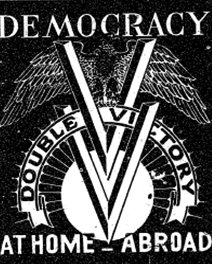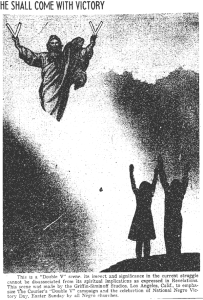Easter 1942, A Reflection on the Double Victory Campaign
Since this is the Easter holiday weekend, I thought it would be appropriate to reflect on another Easter 73 years ago. Easter Sunday 1942 occurred four months after the bombing of Pearl Harbor and during a time when patriotic fervor swept the nation. Within the African American community there was another campaign gaining traction, the Pittsburgh Courier’s Double Victory campaign which sought victory at home and abroad. The National Baptist Convention and other African American organizations declared Easter, April 5, 1942, National Negro Double Victory Day in which clergy across the country who endorsed the campaign and its agenda. Similar to Black Lives Matter Sunday, National Negro Double Victory Day merged a significant moment on the Christian calendar with contemporary civil rights issues.
The Double Victory Campaign began in earnest in 1942. On January 31,1942 The Pittsburgh Courier featured a letter to the editor from James G. Thompson, a cafeteria worker in Wichita Kansas. Thompson expressed his patriotism, but was confounded by the inequality, discrimination, and oppression he experienced daily in the United States. He was willing to serve his country, and even die in that service. The juxtaposition between Thompson’s loyalty to his country and the country’s disloyalty to him, provoked him to pose the questions: “Should I sacrifice my life to live half American?” In response to this conundrum, Thompson proposed a new campaign.
“I suggest that while we keep defense and victory in the forefront that we don’t lose sight of our fight for true democracy at home….The V for victory sign is being displayed prominently in all so-called democratic countries which are fighting for victory over aggression, slavery, and tyranny. If this V sign means that to those now engaged in this great conflict then let we colored Americans adopt the double VV for a double victory. The first V for victory, over our enemies from without, the second V for victory over our enemies within. For surely those who perpetrate these ugly prejudices here are seeking to destroy our democratic form of government just as surely as the Axis forces.”[1]
Two weeks later, The Pittsburgh Courier would respond to Thompson’s proposal with a statement that would launch the Double Victory Campaign.
“We as colored Americans, are determined to protect our country, our form of government, and the freedom which we cherish for ourselves and for the rest of the world, therefore we have adopted the Double “V” war cry – victory over our enemies at home and victory over our enemies on the battlefields abroad. This is our fight for freedom as we wage a two pronged attack against our enslavers at home and those abroad who would enslave us. WE HAVE A STAKE IN THIS FIGHT…WE ARE AMERICANS, TOO!”[2]
The campaign captured the momentum gained by A. Philip Randolph’s March on Washington Movement. Although President Roosevelt had signed Executive Order 8802 prohibiting segregation in the defense industries, the industries were still not hiring African Americans. African Americans were calling for stronger oversight of the defense industries’ hiring practices.
In March 1942, National Baptist Convention, the National Negro Council, and other African American organizations decided to use the Easter holiday to highlight the Double V campaign, more specifically issues of inequality. The issues included: demand for hearing by Truman Senate Committee Investigating National Defense to investigate racial discrimination in the government and private industry; support to the president against forces that would sabotage several New Deal programs in which African Americans benefited; the abolition of the poll tax law by Congress; advocating for the employment of more African Americans by the government for the sale of war bonds; the distribution of gas masks to all American regardless of color; the passing of a federal anti-lynch law; and preventing the extension of Jim Crow in National Parks. Pastors were encouraged to integrate the campaign and these issues into their Easter sermons.
Perhaps what is compelling about the Easter Sunday publicity campaign is that it merged Christian celebration with civil rights interests. A key aspect of African American Christian theological thought is the relevancy of scripture in contemporary life. Easter Sunday 1942 demonstrates the African American church’s involvement twenty years prior to the modern civil rights movement in a major civil rights campaign.
The Double Victory campaign would continue to gain momentum through 1942 and fade out by 1943. Double Victory clubs were formed and rapidly increased from 38 in May 1942 to 206 in August. There were calls for buttons and stickers. Andy Razaf and J.C. Johnson compose a Double Victory campaign song. By 1943 some of the issues of injustice were being addressed: Black women were accepted into the Women’s Auxiliary Army Corps; the Red Cross began accepting blood from African Americans; more Black men and women were hired in the defense industries. The end of the campaign may seem anti-climactic, but significant gains were made. The end of the movement has been best described by former Pittsburgh Courier journalist, Frank Bolden…
“What else could we do? We had knocked on the door and gotten some attention and so the editors said, “Let’s concentrate on what people are doing.” For example, why would I want to read about the Double V when people are already working in a war plant down the street? I wouldn’t. These gains showed good faith intentions by the government and other people [those who owned war plants], and we should follow suit… In other words, the Double V was like a Roman candle. It flared up, it did its work and then died down. It wasn’t the sole reason things opened up [in the armed forces and industry], but it certainly woke people up.”[3]
[1] Pittsburgh Courier, January 31, 1942.
[2] Pittsburgh Courier February 14, 1942
[3] Washburn, Patrick. “The Pittsburgh Courier’s Double V Campaign in 1942.” American Journalism 1986 no. 2 : 73 – 86.
Copyright © AAIHS. May not be reprinted without permission.



Noelle-
I enjoyed your piece. I have been researching the Double V campaign off and on for the past four years. I am a baseball researcher specializing in the Negro Leagues and baseball integration, and I have written about how Double V was the theme under which baseball integration occurrred.
I have gone extensively through the Courier and had noticed that Easter Sunday campaign. I would love to find out more about it- were their speeches at particular churches, and given my research interest, I especially would like to find out if any Easter Sunday baseball games were played where Double V rallies occurred. Do you have any suggestions?
Sincerely,
Duke Goldman
Baseball Researcher and member of the Society for American Baseball Research (SABR)